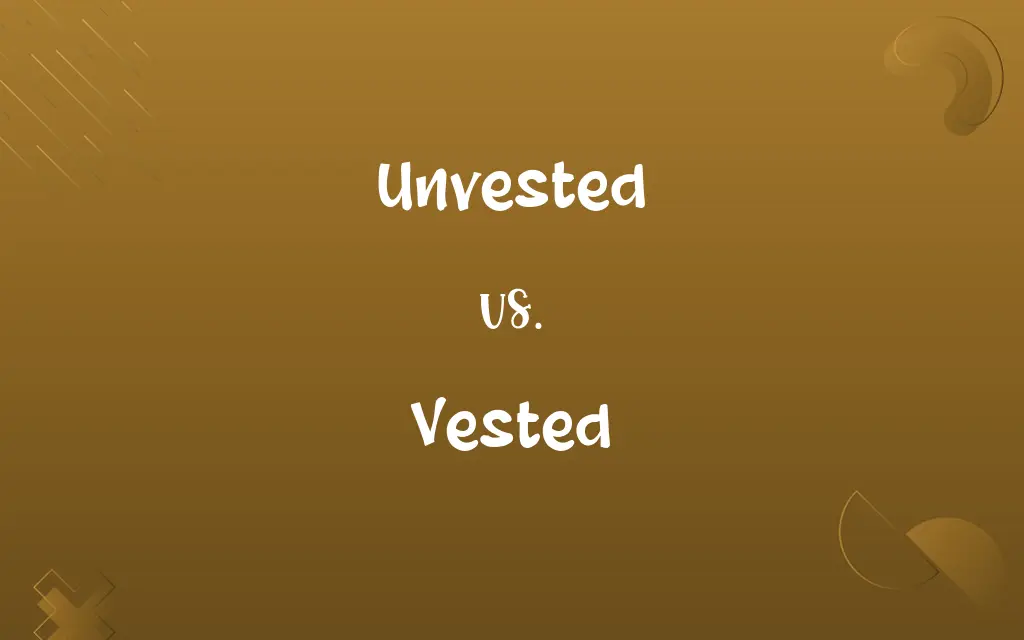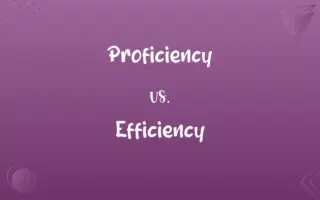Unvested vs. Vested: Know the Difference

By Shumaila Saeed & Dua Fatima || Updated on March 4, 2024
Unvested benefits are not yet fully earned and can be forfeited, while vested benefits are fully earned and cannot be lost when leaving a job.

Key Differences
Unvested benefits, often found in employee compensation packages, such as stock options or retirement plans, are contingent upon meeting certain conditions or staying with the employer for a specified period. These benefits are designed to incentivize employee loyalty and long-term commitment. Vested benefits, on the other hand, are those that the employee has earned outright. Once vested, the employee retains ownership of these benefits, regardless of their employment status with the company.
Shumaila Saeed
Mar 04, 2024
The process of becoming vested can vary significantly between different types of compensation plans. For instance, some plans may require a certain number of years of service before benefits become fully vested, while others may vest incrementally over time. This gradual transition from unvested to vested ensures that employees remain motivated to contribute to the company's success over a longer period. Conversely, vested benefits, once granted, signify the employee's fulfilled commitment and are no longer conditional upon continued employment.
Shumaila Saeed
Mar 04, 2024
In the context of stock options, unvested options cannot be exercised and are lost if the employee leaves the company before they vest. Vested stock options, however, can be exercised according to the terms of the option plan, even after leaving the company, within a specified timeframe. This distinction is crucial for employees making career decisions, as it affects the tangible value of their compensation package.
Shumaila Saeed
Mar 04, 2024
Retirement benefits also illustrate the difference between unvested and vested status. Employees may need to work a certain number of years before they have a non-forfeitable right to their retirement benefits. Once vested, employees are entitled to their retirement benefits, even if they no longer work for the employer, ensuring financial security in retirement.
Dua Fatima
Mar 04, 2024
The concept of vesting serves as a retention tool for employers, encouraging employees to remain with the company long enough to earn their full benefits. It reflects the company's investment in its workforce and the employee's earned reward for their service. Respectively, understanding the vesting schedule and the implications of vested versus unvested benefits is essential for employees in planning their career and financial future.
Shumaila Saeed
Mar 04, 2024
ADVERTISEMENT
Comparison Chart
Portability
Cannot be retained upon leaving job
Retained even after leaving job
Shumaila Saeed
Mar 04, 2024
Conditions
Subject to meeting specific criteria
No further conditions to be met
Shumaila Saeed
Mar 04, 2024
Impact on Employees
Incentivizes long-term commitment
Represents earned compensation
Dua Fatima
Mar 04, 2024
Example in Practice
Stock options not yet exercisable
Stock options that can be exercised
Shumaila Saeed
Mar 04, 2024
ADVERTISEMENT
Unvested and Vested Definitions
Unvested
Conditional upon continued employment or performance targets.
Her relocation expenses will remain unvested until she completes a year of service.
Shumaila Saeed
Mar 04, 2024
Vested
Rights to compensation that remain with an employee after job termination.
Her vested stock options can still be exercised for 90 days after leaving.
Hifza Nasir
Mar 04, 2024
Unvested
Benefits not fully earned and conditional on future service.
Her stock options remain unvested until her third work anniversary.
Shumaila Saeed
Mar 04, 2024
Vested
Reflects the completion of required service or conditions.
His vested interest in the profit-sharing plan reflects his long-term commitment.
Dua Fatima
Mar 04, 2024
Unvested
Part of an incentive plan to retain employees.
Unvested bonuses encourage employees to stay longer with the company.
Hifza Nasir
Mar 04, 2024
ADVERTISEMENT
Vested
Benefits fully earned and owned by an employee.
After five years, all his retirement benefits are vested.
Shumaila Saeed
Mar 04, 2024
Unvested
Rights to compensation that may be forfeited if conditions aren't met.
If he leaves now, his unvested pension contributions will be lost.
Shumaila Saeed
Mar 04, 2024
Vested
Immediately exercisable or transferable rights.
The vested shares contribute to her immediate financial planning options.
Shumaila Saeed
Mar 04, 2024
Unvested
Not yet transferable or exercisable by the employee.
The unvested shares are not yet part of her tangible assets.
Dua Fatima
Mar 04, 2024
Vested
Unaffected by future employment status changes.
Her vested pension benefits are secured, regardless of her decision to change jobs.
Shumaila Saeed
Mar 04, 2024
Vested
Having full ownership rights, especially after certain conditions such as a period of service, have been met
Vested stock options.
An employee vested in a retirement account.
Shumaila Saeed
Oct 19, 2023
Repeatedly Asked Queries
What does vested mean?
Vested means benefits or compensation that an employee has fully earned and owns, unaffected by future employment status.
Shumaila Saeed
Mar 04, 2024
What happens to unvested benefits if I leave my job?
Unvested benefits are typically forfeited if you leave your job before they become vested.
Hifza Nasir
Mar 04, 2024
Can unvested benefits become vested?
Yes, unvested benefits become vested once the predetermined conditions, such as tenure or performance targets, are met.
Shumaila Saeed
Mar 04, 2024
Do all companies offer vested benefits?
Offering vested benefits is at the discretion of the employer and varies between companies.
Shumaila Saeed
Mar 04, 2024
What does unvested mean?
Unvested refers to benefits or compensation that an employee has not fully earned and which may be forfeited under certain conditions.
Dua Fatima
Mar 04, 2024
Are vested benefits always related to retirement plans?
No, vested benefits can include stock options, profit sharing, and other forms of compensation beyond retirement plans.
Dua Fatima
Mar 04, 2024
Can vested benefits be taken away?
Once benefits are vested, they cannot be taken away and remain with the employee regardless of employment status.
Shumaila Saeed
Mar 04, 2024
Why do employers use vesting?
Employers use vesting to incentivize loyalty and long-term commitment from their employees.
Shumaila Saeed
Mar 04, 2024
How does vesting affect an employee's decision to leave a company?
The potential loss of unvested benefits can be a significant factor in an employee's decision to stay with a company.
Shumaila Saeed
Mar 04, 2024
What is the difference between cliff vesting and graded vesting?
Cliff vesting grants full benefits after a specific period, while graded vesting gradually increases ownership over time.
Shumaila Saeed
Mar 04, 2024
How does one become vested?
Vesting occurs upon meeting specific conditions set by the employer, such as years of service or performance goals.
Shumaila Saeed
Mar 04, 2024
Is vesting immediate for all types of benefits?
No, vesting schedules vary and may require several years or fulfillment of specific criteria.
Hifza Nasir
Mar 04, 2024
Can an employee negotiate their vesting terms?
Vesting terms are typically set by the employer but may be negotiable in some cases, especially for high-level positions.
Shumaila Saeed
Mar 04, 2024
How do vested benefits impact financial planning?
Vested benefits are an important part of an employee's financial planning, offering security and resources for the future.
Dua Fatima
Mar 04, 2024
What is a vesting schedule?
A vesting schedule outlines the timeframe and conditions under which benefits become vested.
Hifza Nasir
Mar 04, 2024
Share this page
Link for your blog / website
HTML
Link to share via messenger
About Author
Written by
Shumaila SaeedShumaila Saeed, an expert content creator with 6 years of experience, specializes in distilling complex topics into easily digestible comparisons, shining a light on the nuances that both inform and educate readers with clarity and accuracy.
Co-written by
Dua Fatima







































































